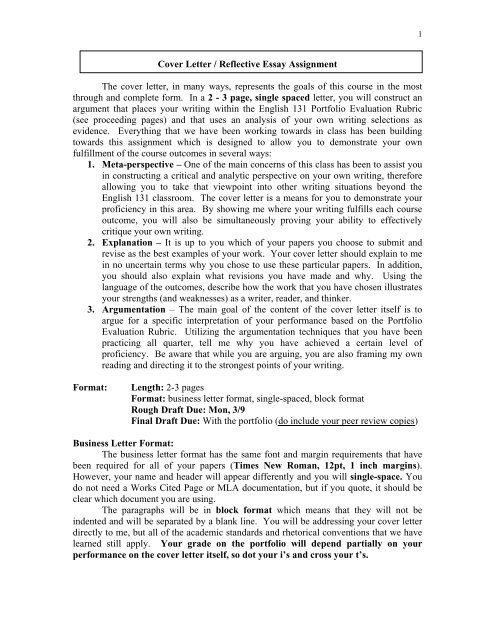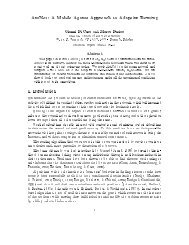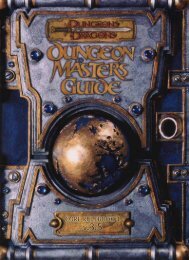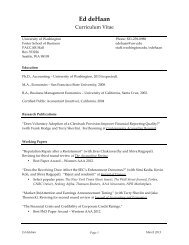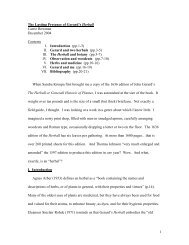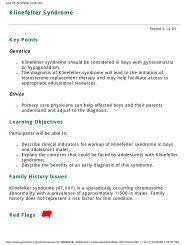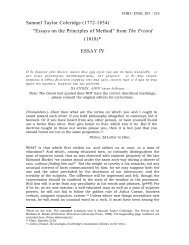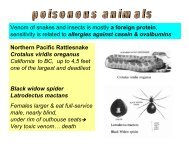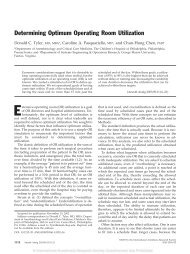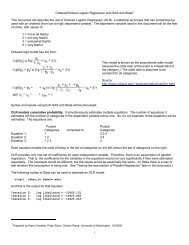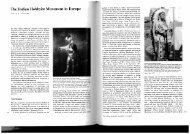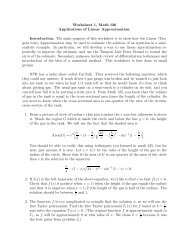Cover Letter / Reflective Essay Assignment - University of Washington
Cover Letter / Reflective Essay Assignment - University of Washington
Cover Letter / Reflective Essay Assignment - University of Washington
Create successful ePaper yourself
Turn your PDF publications into a flip-book with our unique Google optimized e-Paper software.
<strong>Cover</strong> <strong>Letter</strong> / <strong>Reflective</strong> <strong>Essay</strong> <strong>Assignment</strong><br />
The cover letter, in many ways, represents the goals <strong>of</strong> this course in the most<br />
through and complete form. In a 2 - 3 page, single spaced letter, you will construct an<br />
argument that places your writing within the English 131 Portfolio Evaluation Rubric<br />
(see proceeding pages) and that uses an analysis <strong>of</strong> your own writing selections as<br />
evidence. Everything that we have been working towards in class has been building<br />
towards this assignment which is designed to allow you to demonstrate your own<br />
fulfillment <strong>of</strong> the course outcomes in several ways:<br />
1. Meta-perspective – One <strong>of</strong> the main concerns <strong>of</strong> this class has been to assist you<br />
in constructing a critical and analytic perspective on your own writing, therefore<br />
allowing you to take that viewpoint into other writing situations beyond the<br />
English 131 classroom. The cover letter is a means for you to demonstrate your<br />
pr<strong>of</strong>iciency in this area. By showing me where your writing fulfills each course<br />
outcome, you will also be simultaneously proving your ability to effectively<br />
critique your own writing.<br />
2. Explanation – It is up to you which <strong>of</strong> your papers you choose to submit and<br />
revise as the best examples <strong>of</strong> your work. Your cover letter should explain to me<br />
in no uncertain terms why you chose to use these particular papers. In addition,<br />
you should also explain what revisions you have made and why. Using the<br />
language <strong>of</strong> the outcomes, describe how the work that you have chosen illustrates<br />
your strengths (and weaknesses) as a writer, reader, and thinker.<br />
3. Argumentation – The main goal <strong>of</strong> the content <strong>of</strong> the cover letter itself is to<br />
argue for a specific interpretation <strong>of</strong> your performance based on the Portfolio<br />
Evaluation Rubric. Utilizing the argumentation techniques that you have been<br />
practicing all quarter, tell me why you have achieved a certain level <strong>of</strong><br />
pr<strong>of</strong>iciency. Be aware that while you are arguing, you are also framing my own<br />
reading and directing it to the strongest points <strong>of</strong> your writing.<br />
Format: Length: 2-3 pages<br />
Format: business letter format, single-spaced, block format<br />
Rough Draft Due: Mon, 3/9<br />
Final Draft Due: With the portfolio (do include your peer review copies)<br />
Business <strong>Letter</strong> Format:<br />
The business letter format has the same font and margin requirements that have<br />
been required for all <strong>of</strong> your papers (Times New Roman, 12pt, 1 inch margins).<br />
However, your name and header will appear differently and you will single-space. You<br />
do not need a Works Cited Page or MLA documentation, but if you quote, it should be<br />
clear which document you are using.<br />
The paragraphs will be in block format which means that they will not be<br />
indented and will be separated by a blank line. You will be addressing your cover letter<br />
directly to me, but all <strong>of</strong> the academic standards and rhetorical conventions that we have<br />
learned still apply. Your grade on the portfolio will depend partially on your<br />
performance on the cover letter itself, so dot your i’s and cross your t’s.<br />
1
Sample:<br />
<br />
Jun Xu<br />
Department <strong>of</strong> English, Box 354330<br />
<strong>University</strong> <strong>of</strong> <strong>Washington</strong><br />
Seattle, WA 98195-4330<br />
Dear Dr. Xu:<br />
I am writing this letter to you in order to illustrate, as a sample, the format <strong>of</strong> the cover<br />
letter. As you can clearly see, the tone <strong>of</strong> the letter itself is formal and controlled,<br />
mirroring the tone that I have been struggling to establish in my own writing all quarter<br />
long. In your Portfolio Packet you noted that each cover letter should use “the same font<br />
and margin requirements that have been required for all <strong>of</strong> [our] papers.” Taking this<br />
direction into account, I have taken care to use Times New Roman Font at the 12 point<br />
size requirement and have set my page margins at a sensible one inch.<br />
You may also notice that the paragraphs themselves are not indented. I am however<br />
careful to leave a space in-between each separate paragraph in order to properly conform<br />
to the “block format” that is required <strong>of</strong> a business letter <strong>of</strong> this type. There are many<br />
reasons to do this, the foremost among them being that you told me to.<br />
Blah Blah Blah… and so on.<br />
Sincerely,<br />
<br />
<br />
Of course this sample only illustrates the format requirements <strong>of</strong> the cover letter and not<br />
its content requirements. How you chose to argue for your particular place in the Rubric<br />
is up to you and will be dependant on your engagement with your own work. I would<br />
like you to remember that there are multiple requirements for this course, some <strong>of</strong> which<br />
you may be more pr<strong>of</strong>icient in than others. Learning is not an even and linear process<br />
and telling me about your experience in this class may be an important part <strong>of</strong> explaining<br />
your argument. However, keep the following things in mind:<br />
2
TIPS FOR THE COVER LETTER:<br />
The cover letter is not a place to…<br />
- tell me how English 131 “changed your life.” Of course, I hope that this class,<br />
both in its content and writing challenges, has given you something to think about in a<br />
larger context. But remember to consider your audience (me). It is essential in this<br />
assignment to address your audience effectively in a way that is convincing. Overt<br />
appeals to my ego as a teacher or overly emotional sentiments will be noticed (and I<br />
probably won’t believe you anyways).<br />
- tell me how you have “progressed from a novice to an expert academic<br />
writer in ten easy weeks.” Again, remember that learning does not progress in a straight<br />
line from ignorance to enlightenment. Your claim does not have to necessarily imply that<br />
you are now a perfect writer and that the class has been wonderful in order for you to<br />
prove that you have fulfilled the outcomes. Again, remember your audience. Are you<br />
interested in claiming that you are an “expert” at this point? Will I be interested in<br />
arguing against you?<br />
-apologize. I am not interested in reading any type <strong>of</strong> apology for any work that<br />
you HAVEN’T done over the course <strong>of</strong> this quarter. Of course we all have things that we<br />
could have done better in the last ten weeks and we all have reasons for why those things<br />
didn’t happen. Your energy should be directed at engaging me in the work that you<br />
HAVE done. Just as false enthusiasm will discourage my reading <strong>of</strong> your argument, sob<br />
stories will distract from the credit that you may have rightfully earned.<br />
-critique the class. There will be a formal opportunity on the last day for each<br />
and every one <strong>of</strong> you to <strong>of</strong>ficially evaluate both the structure <strong>of</strong> the course and my<br />
performance as your instructor. Citing problems <strong>of</strong> the course within your cover letter<br />
can only direct my attention to the problems in your writing, instead <strong>of</strong> making me<br />
excited about its strengths.<br />
-tell me how all <strong>of</strong> your work is perfect. It’s not. I will be grading based on<br />
your overall performance, while paying close attention to the outcomes as they are<br />
outlined in the cover letter. This does not mean, however, that all <strong>of</strong> your papers have to<br />
be pitch-perfect in order to make a good grade. While your major paper selection should<br />
illustrate all four <strong>of</strong> the outcomes, it is not necessary for your shorter papers to<br />
necessarily illustrate EVERY point (that’s why you get to chose 4-6) In addition,<br />
pointing out your own imperfections has the double effect <strong>of</strong> telling me that you can see<br />
where you have still fallen short (thus telling me that you know the difference between<br />
failing and succeeding in this case) and also acts like a counterclaim that heads my own<br />
criticism <strong>of</strong>f at the pass. But be careful to not overdo it. And remember, I will still be<br />
grading based on these imperfections, but may react differently if I have to find them<br />
myself.<br />
3
The cover letter is a GREAT place to…<br />
- honestly and effectively evaluate your own work. Remember that I will be<br />
constructing my own evaluation <strong>of</strong> your work in my reading <strong>of</strong> your revised pieces. In<br />
this way, the cover letter serves as a powerful rhetorical device that can direct me, ahead<br />
<strong>of</strong> time, to the best and brightest parts <strong>of</strong> your writing. It might also be a place to<br />
acknowledge any weaknesses (which will illustrate your ability to identify them as such)<br />
and therefore allow you to incorporate them into your argument, strengthening it overall.<br />
- illustrate your pr<strong>of</strong>iciency in the outcomes as you are identifying them. Use<br />
the skills in academic writing that you have accumulated! Quote your own work and<br />
analyze it! Construct an argument that tracks a claim down several lines <strong>of</strong> inquiry! Sell<br />
your argument with some <strong>of</strong> the rhetorical devices that we have explored. This time,<br />
your writing has an immediate importance and context. Use it to your advantage!<br />
4


